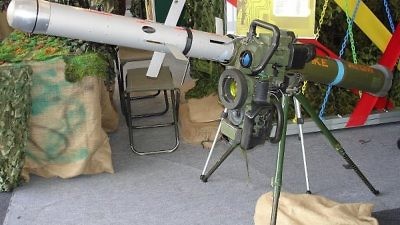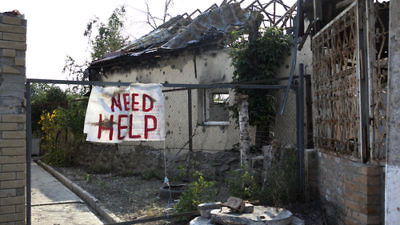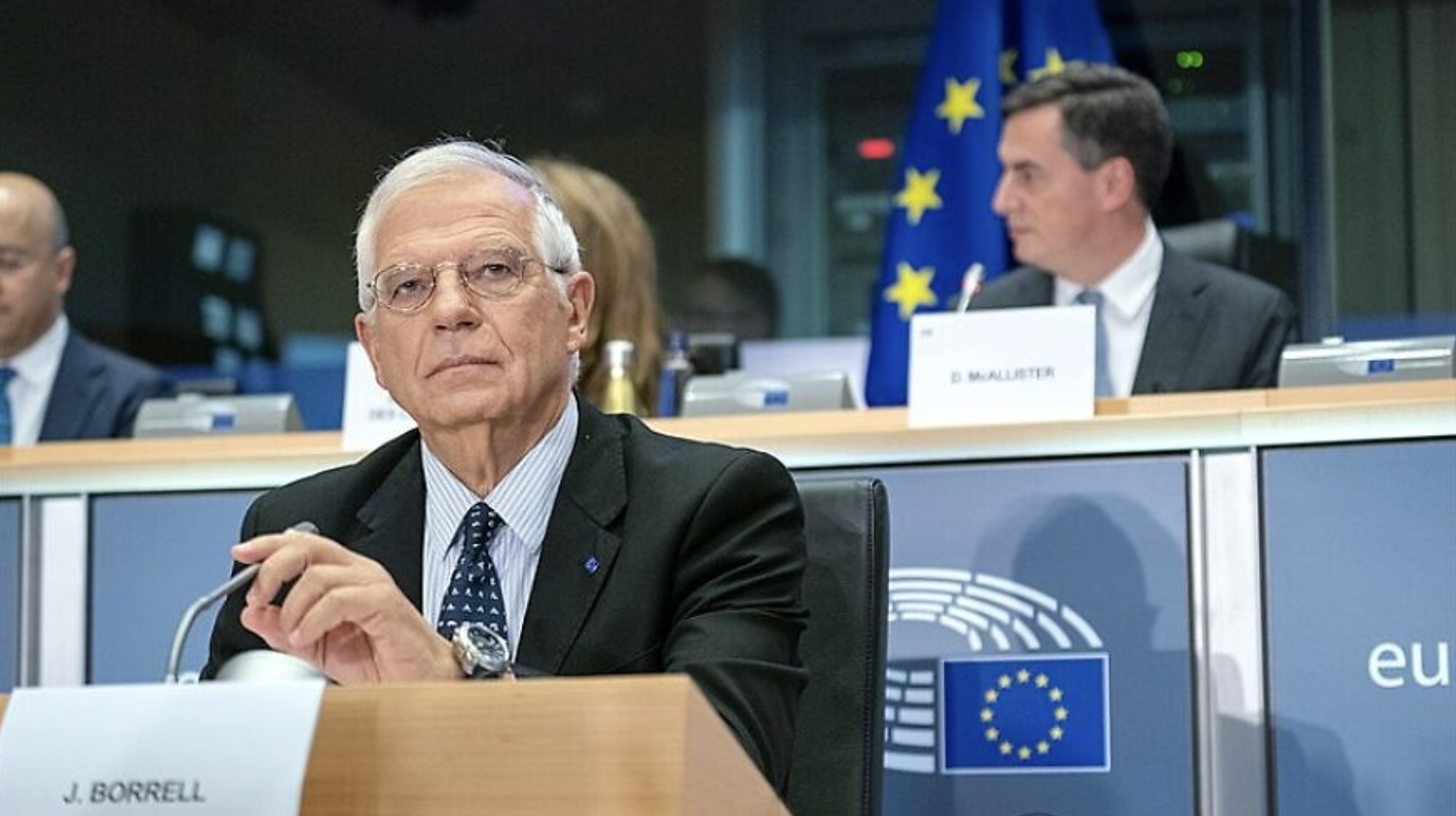Government ministers from Israel and the European Union met on Oct. 3 for the first “Association talks” since 2012. Intelligence Minister Elazar Stern headed the Israeli delegation at the E.U.-Israel Association Council session in Brussels.
Established in 1995 and first operating in 2000, the group has not met since July 2012, in part due to differences in views over Jewish communities in Judea and Samaria, commonly known as the West Bank. Bouts of violence between Palestinians and Israel, along with the COVID-19 pandemic, frequent Israeli elections, and problems within the E.U. further delayed any such meetings.
With a new government in Jerusalem, it seems both Europe and Israel are ready to move forward.
Israeli Prime Minister Yair Lapid remarked, “This is the forum that will allow us to advance economic ties between Israel and the E.U., and strengthen our fight to lower the cost of living, in both Israel and Europe. This council has not convened in over a decade—for the wrong reasons.”
The main goals of the meeting, according to Israel’s Government Press Office, were to “contribute to the expansion of economic-diplomatic ties between Israel and the E.U.…and the advancing of bilateral cooperation in trade, climate, energy, water technology, digitalization, cyber and health.”
Palestinians, Abraham Accords and Counterterrorism
“The E.U. is Israel’s main trading partner, but we share more than just economic interests; we share liberal and democratic values. These values are under attack, and we must stand firm against this attack, together,” Lapid said.
Due to the election campaign and the increase in terrorist attacks in Judea and Samaria, the prime minister decided to attend the meeting virtually.
Lapid, as he had at the United Nations General Assembly meeting last month, committed to seeing through the two-state solution. He stressed, however, that Jerusalem will remain Israel’s eternally-united capital, and that the Palestinians must lay down arms to achieve an independent state. Indeed, the issues of cooperation against terrorism and fighting the Boycott, Divestment and Sanctions (BDS) Movement were high on the agenda at the meeting.
Seth J. Frantzman, director of the Middle East Center for Reporting and Analysis (MECRA), laid bare some of the ways that the E.U.-Israel dynamic has changed over the past decade.
“The Abraham Accords have paved the way for a major shift in the way countries can work with Israel, because now inclusive ties with Israel and the Gulf, as well as other states such as Morocco, can naturally include Israel, Frantzman told JNS.
“In the past, some countries believed they had to work on ties with Israel on a separate track rather than working with other states in the Middle East. This segmentation led to a culture in some foreign ministries and governments where there would be those considered ‘pro-Arab’ diplomats and those who were accused of being ‘Zionists.’ This unhelpful politicization and balkanization of foreign policy contributed to conflict in the Middle East rather than normalization,” he said.
Frantzman also believes that while former Prime Minister Benjamin Netanyahu was deemed unpalatable by European governments due to the Palestinian issue, Israel’s closer relationship with Cyprus, Greece and the Visegrad states (the Czech Republic, Hungary, Poland and Slovakia) allowed it to maintain influence on the Continent.
Peter Baum is the foreign editor of the Weekly Blitz and a writer with the Gatestone Institute. He agrees that global conditions and dynamics have shifted the E.U.’s attention slightly away from the Palestinians and towards Israel.
“The coalition government has certainly facilitated flexibility but E.U. politicians recognize that Israel changes governments too frequently to ensure continuity on any subject let alone something as important as this, he told JNS.
“The Abraham Accords have been remarkable in facilitating relationship normalization between Israel and a number of Arab countries. Economically and strategically this has assisted all and will undoubtedly expand to other countries. The Biden administration continues to support [former President Donald] Trump’s initiative and the economic benefits have been truly encouraging to all concerned. The E.U. recognizes this and will want to leverage on such developments and we are witnessing this week by week. Only BDS [supporters] are upset,” Baum continued.
Emmanuel Navon of the Kohelet Policy Forum believes there is reason for optimism.
The France-born author of “The Star and the Scepter: A Diplomatic History of Israel” told JNS, “The signature of the Abraham Accords has proven without a doubt that you can have normalization without a resolution of the dispute with the Palestinians. I think the Europeans are now becoming aware of that. But if you combine that with the Ukraine war, and the economic and food crises it generated, it created a deeper axis with Israel and the E.U., along with Arab countries.
“The Europeans need to diversify their sources of natural gas, and Israel is a natural regional partner in this regard and a key player. Just two years ago, some European leaders dismissed the accords as a gimmick with no real significance. Now we see more European leaders realizing the importance of the Abraham Accords for Europe itself, given the technological and energy prowess. For example, Morocco with phosphorus and Bahrain and Israel with oil and natural gas. It has the potential of helping improve European energy and food security in the face of Russian aggression and the war in Europe,” Navon said.
Still, he maintains that there is worry in Brussels over the Israeli election. Some Europeans, Navon maintains, are concerned about extremist politicians in Netanyahu’s bloc such as Knesset members Itamar Ben-Gvir and Bezalel Smotrich, both of whom are part of the ultranationalist Religious Zionism alliance who have made incendiary comments about Arabs.
“What worries many Europeans, alongside Israelis, is that Netanyahu is obsessed with his trial,” Navon pointed out, opining that this has left the former prime minister with no choice to turn to unpalatable political partners to save him from corruption charges.
E.U. foreign policy chief Josep Borell was in attendance at the Brussels meeting and focused squarely on the Palestinians. In fact, just a day after the session, the E.U. slammed Israeli policy on the Temple Mount—known to Muslims as Haram al-Sharif—and called on Israel to refrain from demolitions and settlement building in the Judea and Samaria.
Human Rights Watch and Amnesty International, both heavy critics of Israel that accuse the Jewish state of being an apartheid regime, held a Zoom conference at the same time as the council meeting, on alleged Israeli human rights violations. Both organizations slammed E.U. ministers for meeting with Israeli officials and encouraged them to press Israel on the two-state solution.
“European officials should know they’ll be shaking hands with representatives of a government committing crimes against humanity and that has outlawed prominent civil society groups challenging these abuses,” said Omar Shakir, director of the Israel and Palestine Office at Human Rights Watch.
It is likely that this pressure from activist circles—mainly Muslims and on the far left—has pressed Brussels to bring up issues related to the Palestinians in the conference. Still, as Navon said, “the purpose [of the Association Council] is to have a dialogue…to keep an open channel of discussion,” even if there are disagreements.

High-tech, cost of living, and climate change
On the agenda for Israel and Europe are technology sales and increasing cooperation on climate change. This includes arms and drone sales to Europe that previously were seen as controversial.
“The E.U. and Israel are natural partners on many issues. Israel is a hi-tech economy and has natural affinities for Europe, not only due to history but also due to the current trends globally. Israel’s close ties with the UAE, India, Australia, South Korea and the U.S. mean that Israel is a key hub of interaction between Europe and the East, as well as between Europe and the US,” Frantzman said.
“These ties relate to security in the Eastern Mediterranean as well as technology, culture, science, trade and also defense ties. European countries are increasingly looking at Israeli technology to defend against drone and missile threats as well as to secure borders and provide detection systems and also capabilities such as missiles. For instance, Israel’s MMR [multi-mission] radar has been acquired by the Czech Republic and Slovakia while Israel’s Spike missiles are used in Europe via the Eurospike program,” he said.
In recent years, as climate change has become a bigger issue, Israel has touted its expertise in agri-tech such as drip irrigation, usually to less developed countries. However, the summer of 2022 brought severe drought to European river cities.
Israeli desalination plants are also gaining increasing relevance throughout the Mediterranean and Gulf regions, with harsher summer weather and longer droughts expected to kick in around mid-century.
“Israel being a technological powerhouse in research and development, especially with water security, is a reason why we’re being included in European technological and environmental forums,” said Navon.
Baum, too, emphasized the importance climate change has had for the agenda between Jerusalem and Brussels.
“Israeli innovation and brilliance in this technology will be the ultimate driver in ensuring not only better E.U. relations with Israel but global relations with Israel…Naturally, Israel’s friends in the Mediterranean will also benefit and leverage up economically. Israel and its partners in the Mediterranean are regularly in discussions to expand cooperation, as we witness almost daily from media output,” he said.
Lapid, in his address to the meeting, noted that Israel joined the Horizon Europe program last December, an agreement that will last through 2027.
“We are set to sign an agreement with Europe, and I hope we will conclude the signing of Creative Europe soon. We hope that now the path will be paved for Israel’s participation in other European programs: Digital Europe, Invest-EU, EU4Health and more.”
Lapid has also sought to bring European supermarkets to Israel, from France and the Netherlands, hoping that this will increase competition and drive down prices.
“Israel needs access to European economies of scale to lower prices; and with COVID and then the Russia invasion leading to inflation and supply chain problems, this issue is more acute than before,” said Frantzman. “However Israel is a protectionist economy. It has historically protected its own producers and it has a legacy in socialism and the ideas of the 1950s and 1960s that relate to having a lot of products be made in Israel or having Israeli firms control the process locally. That means Israel has many international brands today, but some of them still face hurdles and some basic items such as olive oil are taxed heavily or more expensive in markets.
“The same is true for automobiles, which tend to be much more expensive in Israel. In some ways, Israel appears to be as expensive as Norway, Switzerland or some of the most pricey countries in the world, even though Israelis do not make salaries similar to many of their Western peers. This hybrid economy may be liberalized, or it may continue as it has in the past. It’s unclear if leaders in Israel can tame the powerful lobbies and tycoons that have created this economic system which makes things very expensive.”
Baum takes a slightly less optimistic view.
“Having just returned from Israel, it is remarkable to me how Israelis can afford to live. All countries in Europe are facing similar challenges, and my opinion on these matters is, I’m afraid, rather simplistic. The government must encourage and subsidize local food production. The establishment of cheap European supermarkets within Israel may assist, but it is of secondary importance.”

Energy and Iran
Perhaps the biggest challenge Israel faces regarding its relationship with Europe is Iran. The European Union, in particular France and Germany, has sought increased diplomatic engagement with the Islamic Republic in the form of a nuclear deal. Great Britain, which left the European Union in 2020, has also been pushing for engagement with the Islamic Republic.
Frantzman explains the source of this interest in engagement with Tehran.
“Support for the nuclear deal was generally predicated on the idea that if there wasn’t a deal then there would be another ‘war’ in the Middle East. Iran’s regime was portrayed as potentially ‘moderate.’ However, recent years have shown that Iran’s regime is not becoming moderate and interested in the West,” he said.
Between the protests raging in the country, its military support to Russia, and its missile strikes in Iraqi Kurdistan, there is a growing understanding in Brussels that appeasing Iran might not be moral or possible,” he added.
“Even though European countries prefer diplomacy and oppose U.S.-Iran tensions, they see the war in Ukraine as potentially meaning the world will not become more peaceful. That means everyone understands that appeasing Iran has not helped and has only emboldened Russia and Iran.”
Baum said that despite the lip service regarding a nuclear deal, many European governments are beginning to hope for the weakening and eventual collapse of the Iranian regime.
Navon believes that while Europeans are taking a harsher stance on Tehran, many still believe an accord is the best way to address the Iranian nuclear program while preventing war.
However, he warns, “it is becoming clear there isn’t going to be a new deal.”
Lapid has differed in his Iran strategy from Netanyahu in a key way. While opposing a renewed nuclear agreement publicly, Lapid and his predecessor as prime minister, Naftali Bennett, have mostly left these condemnations to military officials while stressing they would be fine with a “longer and stronger” Iran nuclear deal.
While Netanyahu loudly protested the deal at the United Nations or in front of the US Congress, this strategy didn’t bear fruit and alienated many key allies. Now it seems that Israel has given important intelligence information to its Western allies and kept disagreements behind closed doors.
This has made European and American government officials more amenable to Israeli security interests, and so far likely kept a new deal from being signed, their supporters say.
Iran’s malign behavior and strategically-foolish decisions as of late have only further alienated the West. Like the Palestinian issue, Iran did come up in the E.U.-Israel discussions and will continue to be brought up as an area of significant concern (and cooperation) for Israel with its Western allies.
While the appetite for Iranian oil is a key motivator behind the desire for a renewed nuclear deal, Israel is now emerging as an energy exporter of its own.
Jerusalem previously planned a natural gas pipeline running from Israeli and Cypriot natural gas fields to Greece and Italy, and from there to elsewhere in Europe. The United States supported the measure until the Biden administration withdrew its backing earlier this year. While Washington claimed this was for cost and environmental concerns, many believed this was a concession to Turkey, which is in conflict with Greece over Cyprus and natural gas resources in the Mediterranean.
Turkey has proposed its own natural gas pipeline to Europe that will include Israeli gas.
“The EastMed Pipeline has remained a dream for now,” said Frantzman. “It makes sense for Europe and Israel to work on energy security. However, Israel has environmental lobbies. With Israel-Turkey relations improving it is not clear what will become of the EastMed Pipeline concept.

Ultranationalism and Ukraine
As for the situation in Ukraine, all three analysts believe Israel is doing what it can and has understandings with Europe over its relationship with the Kremlin. The European Union understands that Israel is concerned with Russian Jews and their safety and ability to make aliyah, as well as with security arrangements with the Russian military in Syria. Furthermore, Israel has already joined the West in UN efforts to isolate and condemn Moscow. Besides this, Israel has also absorbed tens of thousands of Jews from former Soviet states and given refuge to non-Jewish Ukrainians fleeing the war as well.
The West, including the E.U., doesn’t necessarily need Israel to do more. However, it is widely assumed that even if Israel is sending weapons in addition to the humanitarian aid it publicly sends to Kyiv, it will do so secretly.
Another issue on which Navon, Frantzman and Baum agree is the rising far-right in Europe. While Israelis and Jews in the Diaspora are concerned, given the anti-Semitism of the European far-right historically, all three analysts pointed out how these parties largely have disavowed such beliefs.
They believe the far-right parties are focusing their hostility on Muslim immigration to Europe, and are quite pro-Israel in their worldviews. In any case, Russian President Vladimir Putin’s invasion of Ukraine seems to have unified most of Europe after years of political infighting—which means that Israel’s political inroads in the southeastern portion of the continent will spread westward.
Baum said that the next E.U.-Israel Association Council Meeting will be held next month, according to his sources, adding that lower-level meetings are taking place frequently as well.
An energy-starved Europe, with the rise of nationalist governments concerned by terrorism and illegal immigration, now feels it has a more liberal partner in the Jewish, democratic state to its southeast that is experienced in dealing with these matters.


























